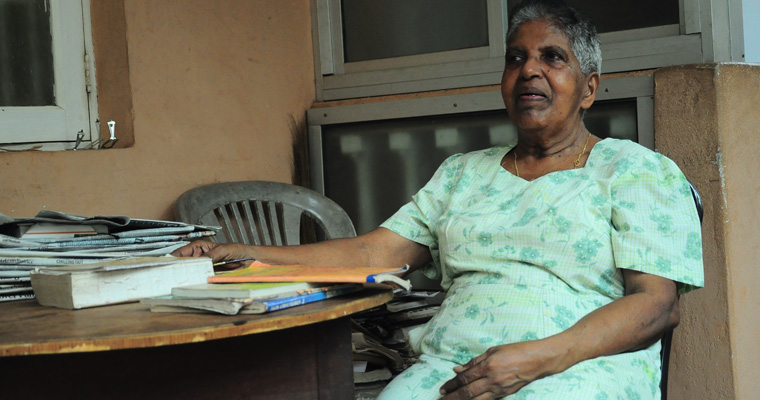The teacher who moved forward step by step
Whether it be humid summers in Goa or the flooded monsoons in Bombay,seek Sarita Carvalho, pill now in her seventies, has braved it all. Physically disabled, she overcame great odds to complete her education and then make a living. When she was a year and a half old, it was medically recommended that she wear special boots tailored by the village shoe maker. The footwear had canes fitted to a normal shoe to lend support and balance. “I was never aware of the defect. I would follow my sister on different terrains and adventures whether it be to school or around cashew trees during recreation,” she remembers.
She shares a very deep bond with her sister. “My sister would sometimes walk barefoot to school with me just to make me feel alright.” She recollects how her family never made her feel different. “Of course, they would not allow me to do the hard work at home. But no one ever labeled me.”
It’s never easy controlling a class full of naughty school kids and it can be even more challenging when you have a physical disability. “Fortunately, we were brought up in a generation where we would respect such situations. Whether it is during my school days or my job as a teacher, I don’t ever recall anyone calling me names or mocking me.”
Sarita graduated in English and French from Ruparel college in 1957. Bombay may not have been as fast as it is today in the 60’s but travelling in the city was tough. “I was afraid I would fall off the bus while ringing the bell so I’d prefer to walk.” She is quick to acknowledge the help of the heavens. “I have had guardian angels all along the way. Be it my friends during graduation in Bombay, the conductors in the buses, the nuns who provided me accommodation and an opportunity to grow as a teacher,” she recalls.
She began teaching at Bhatikar Medium School in Margao in 1961 with a monthly salary of Rs 175/- and has since taught hundreds of students. Many of them remember her as a fun loving person who made learning French absolute fun. “No matter how long it took to drill a certain topic into us, she didn’t budge until she was satisfied that we had assimilated what she had taught us. I feel blessed to have been guided by her,” says Griselda Gonsalves.
Another student, Darlene D’mello, who presently studies at Fr. Agnel, Nuvem, echoes a similar sentiment, “She is always cheerful and very dedicated. She would never let her troubles interfere with her work. She is an amazing teacher but I think she taught me more than just the French language. She taught me lessons of life. She helped me grow pas a pas (step by step)”
Sarita, who now lives in Carmona in South Goa, brushes off all the praise from her students. “Being young, being with children, you tend to forget all your sorrows.” She worries that today’s breed of teachers are less passionate about their work. “One must have the patience and love for children, as not all of them receive enough love at home. You have got to be a child’s friend, the classroom being crowded space and with so many hidden expectations, you ought to make yourself available.”
Chriselda Rodrigues, another of her students, says that Sarita practices what she preaches. “More than being a teacher, she is a humble being and a kind soul. There were days when we would suspect she was in pain but not once did she complain about the trouble. In fact she was always available to whatever I wanted to share with her. She has been like a grandma to me. Her words and her composed personality will always be an inspiration to me.”
Sarita says parents must strive to strike the right balance between discipline and love, between granting freedom and setting limits. “Socializing and group activities teach the child to give and take; how to accept defeat and respect the opponent in victory,” she says.
“Some people live in dark rooms. We never know their source of depression. I was lucky to be in a happy home,” she says of her childhood. “Even though we had little we were happy with what we had and never complained. We did our activities together and never felt alone.” The desire to keep herself busy with work and not to stay idle has served as a distraction to worries and pain.
She has lived her life to see others happy and in turn found happiness. She took tuitions to support her family, especially when her elder sister was widowed. Not only did she help her bring up her two sons but she also sacrificed a secret desire to be a nun.
After I spent some time with Sarita Carvalho, I thought about all the youngsters I’ve known who’ve given up on life. Maybe they failed in an exam, or missed an opportunity at an interview, had a broken relationship or put too much faith in social networking sites telling them they look ugly. They see a cruel world with no hope and no mercy. They forget that they were born with able bodies and all the senses they need to enjoy life. Sarita sees adversity and says, “People are in worse situations than me. I am so much better off.”
.
.
.




